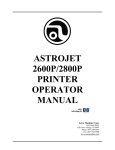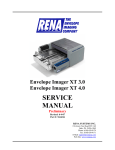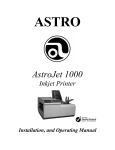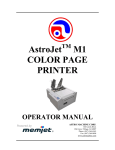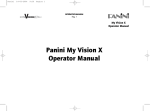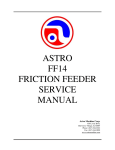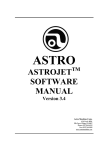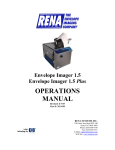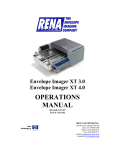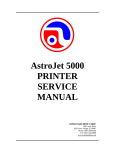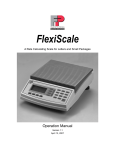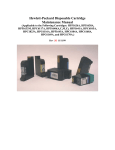Download Astro Machine AstroJet 1000 Troubleshooting guide
Transcript
ASTROJET 1000P
PRINTER
OPERATOR MANUAL
Astro Machine Corp.
630 Lively Blvd.
Elk Grove Village, IL 60007
Phone: (847) 364-6363
Fax: (847) 364-9898
www.astromachine.com
SAFETY PRECAUTIONS
THIS EQUIPMENT PRESENTS NO PROBLEM WHEN USED PROPERLY.
OBSERVE SAFETY RULES WHEN OPERATING THE ASTROJET 1000P PRINTER.
BEFORE USING THE PRINTER, READ THIS MANUAL CAREFULLY AND
FOLLOW THE RECOMMENDED PROCEDURES, SAFETY WARNINGS,
AND INSTRUCTIONS:
Keep hands, hair, and clothing clear of rollers and other moving parts.
Avoid touching moving parts or materials while the machine is in use. Before clearing a jam, be
sure machine mechanisms come to a stop.
Always turn off the machine before making adjustments, cleaning the machine, or performing any
maintenance covered in this manual.
Use power cord supplied with the machine. Plug it into a properly grounded, easily accessible wall
outlet located near the machine. Failure to properly ground the machine can result in severe
personal injury and/or fire.
Power cord and wall plug are the primary means of disconnecting the machine from power supply.
DO NOT use an adapter plug on the line cord or wall outlet.
DO NOT remove the ground pin from the line cord.
DO NOT route the power cord over sharp edges or trap it between furniture.
Avoid using wall outlets that are controlled by wall switches, or shared with other equipment.
Make sure there is no strain on the power cord caused by jamming it between equipment, walls or
furniture.
DO NOT remove covers. Covers enclose hazardous parts that should only be accessed by a
qualified service representative. Report any cover damage to your service representative.
This machine requires periodic maintenance. Contact your authorized service representative for
required service schedules.
To prevent overheating, do not cover the vent openings.
Use this equipment only for its intended purpose.
In addition, follow any specific occupational safety and health standards for your workplace or area.
This manual is intended solely for the use and information of Astro Machine Corp., its designated
agents, customers, and their employees. The information in this guide was obtained from several
different sources that are deemed reliable by all industry standards. To the best of our
knowledge, that information is accurate in all respects. However, neither Astro Machine Corp. nor
any of its agents or employees shall be responsible for any inaccuracies contained herein.
AstroJetTM is a registered trademark of Astro Machine Corp.
Hewlett-Packard is a registered trademark of Hewlett-Packard Corporation.
Windows 95 and Windows 98 are registered trademarks of Microsoft Corporation.
IBM is a registered trademark of International Business Machines.
All other trademarks are the property of their respective holders.
All rights reserved. No part of this book may be reproduced or transmitted in any form or by any means, electronic or mechanical,
including photocopying, recording, or any information storage and retrieval system, without permission in writing from the publisher.
TABLE OF CONTENTS
Table of Contents
SECTION 1 – Getting Acquainted
Operator View
Rear View
Control Panel
SECTION 2 – Installing the Printer
Choose a Location
Connecting Printer
Connecting to Computer
Install Inkjet Cartridges
Setting up Feed
Installing Printer Driver
SECTION 3 – Operating the Printer
Printer Operation
Purge While Printing
Printer Driver Properties
Printing from Microsoft Word
Printing from DeskTop® Mailer
Preparation
Using Barcodes with DeskTop Mailer®
1
1
2
3
5
5
5
5
6
6
7
9
9
11
11
15
17
17
17
SECTION 4 - Maintenance
21
Inkjet Cartridge
Jams in Printer
Replacing Sheet Separators
Replacing Feed Rollers
Cleaning
21
23
23
24
25
Feed Rollers and Forwarding Rollers
Cleaning Media Sensor
SECTION 5 – Troubleshooting Guide
HP Inkjet Print Cartridges
Printer
APPENDIX A – Specifications
APPENDIX B – Supplies and Optional Hardware
Supplies
Optional Hardware
INDEX
25
25
27
27
28
29
30
30
30
31
i
TABLE OF CONTENTS
NOTES
ii
SECTION 1
GETTING ACQUAINTED
SECTION 1 – Getting Acquainted
Operator View
1.
Safety Cover – Encloses Printheads. When raised, it interrupts feeding of media and
stops Printer.
2.
Media Side Guides – Help guide media to Printheads.
3.
Rear Media Guide – Holds media against Front Plate.
4.
Rear Media Support – Holds longer media in position.
5.
Media Thickness Adjustment Knob – Used to set Printheads at proper height for
printing on media.
6.
Printer LCD Display – Displays information about Printer status.
7.
Printer Control Panel – Keys are used to operate Printer.
1
SECTION 1
GETTING ACQUAINTED
Rear View
2
1.
Media Thickness Control Knob – Adjusts height of Printheads.
2.
Sheet Separator Locking Lever – Locks Separators in place after it is adjusted.
3.
Sheet Separator – Separates each piece of media as it is feed.
4.
USB Port – Connects Printer to your computer using your USB Port.
5.
Parallel Port – Connects Printer to Parallel Printer Port on your computer.
6.
Main Power Switch – Turns Printer ON and OFF.
7.
Main Power Fuse – Protects all electronic circuits in Printer.
8.
Power Receptacle – Power cord plugs in here.
9.
Motor Circuit Breaker – Protects Printer’s Motor from overload.
SECTION 1
GETTING ACQUAINTED
Control Panel
1.
ON LINE key – Indicator lights when data is sent to Printer, printing is ready to begin.
This key also turns Printer offline to access Menu Mode.
2.
- key – In Menu Mode, scrolls to the previous selection.
3.
ENTER key – Starts and stops printing.
4.
FAULT Indicator – Indicator lights when there is a problem with printing process.
5.
RESET key – Resets Printer to “standby” state.
6.
+ key – In Menu Mode, scrolls to the next selection.
7.
MENU key – Used to enter Menu Mode to access operator functions.
8.
TEST PRINT key – Puts Printer in Test Mode and prints a sample copy to check
Printer’s output.
9.
OPERATOR DISPLAY – Shows Printer’s status including menus and error messages.
10.
MEDIA THICKNESS ADJUSTMENT KNOB – Adjusts height of Printheads to
compensate for different
media thicknesses.
NOTE: A complete description of the functions and operation of the Printer Keys
can be found in Section 3 – Operating the ASTROJET 1000P.
3
SECTION 1
GETTING ACQUAINTED
NOTES
4
SECTION 2
INSTALLING THE PRINTER
SECTION 2 – Installing the Printer
Before using the Printer:
Choose a location for Printer
Plug in Printer and connect it to computer
Install Inkjet Cartridges
Set up feed on Printer
Install Astrojet 1000P Printer Driver and BIOS Manager software on the computer
Choose a Location
Printer should be placed on a sturdy worktable or cabinet at least 12 inches from any walls. Protect
Printer from excessive heat, dust, and moisture – avoid placing it in direct sunlight.
Connecting Printer
Plugging in Printer
Make sure that Printer’s Main Power Switch is turned OFF.
1.
2.
Connect one end of the power cord to the
rear receptacle on the Printer.
Plug the other end into a 115-220 Volt
AC, 50/60 Hz. grounded outlet.
CAUTION
DO NOT USE ADAPTER PLUGS OR
EXTENSION CORDS TO CONNECT THE
PRINTER TO THE WALL OUTLET.
DO NOT USE OUTLETS CONTROLLED
BY WALL SWITCHES.
DO NOT USE OUTLETS THAT SHARE
THE SAME CIRCUIT WITH LARGE
ELECTRICAL MACHINES OR
APPLICANCES.
Connecting to Computer
Plug the Parallel Printer Cable from your computer
into the rear receptacle on the Printer. Latch the two
locking clips. Cable used to connect the Printer to
the computer must not exceed 6 feet long.
NOTE: Parallel Port may be used for all versions
of Windows. USB Port is used only for Windows
XP and later versions.
5
SECTION 2
INSTALLING THE PRINTER
Install Inkjet Cartridges
Printer can be configured with 5 Inkjet Cartridges. To install the Cartridges:
1.
Remove Inkjet Cartridge from packaging,
taking care not to touch copper contacts,
metal plate, or gold printhead. Remove
protective tape from Printhead.
2.
Open Latch Lever mounted on Inkjet
Cartridge Holder.
3.
With Cartridge’s Printhead pointing
down, slide Cartridge into Holder. Push
down and toward contacts in Holder.
4.
Make sure Cartridge is seated in Holder.
Close Latch Lever to secure Cartridge.
DO NOT force Latch Lever into place.
(See diagram.)
5.
Repeat Steps 1-4 for remaining
Inkjet Cartridges.
Ink in the cartridge may be harmful if
swallowed. Keep new and used cartridges
out of reach of children. Discard empty
cartridges immediately.
Setting up Feed
1.
Release Separator Locking Lever located on
operator’s side of Feeder. Raise Separators
and lock in position. Move Side Guides to
outermost open position. Place one piece of
media in center of Feed Table.
2.
Four Separators on Feeder. Use the two
Center Separators for narrow media and all
four Separators for wide media. Place the
media under the Separators and lower the
Separators so that they rest on the media.
6
SECTION 2
INSTALLING THE PRINTER
3.
Rotate Locking Lever up to lock Separators in place.
4.
Adjust Side Guides to within 1/32-inch of
media. Set Rear Guide so that media is raised
approximately 1/2-inch and rests on curve of
Rear Guide.
NOTE: When running 10-inch or longer or
heavy media you may have to set Rear Guide
so that it just touches the back of the media.
5.
Turn Printer ON.
Turn Media Thickness Knob to set initial
printhead height as follows:
Media Thickness
Dial Setting
0.004" to 1/32"
0 to 2
1/32" to 1/16"
2 to 3
1/16" to 1/8"
3 to 7
1/8" to 1/4"
7 to 10
NOTE: These are initial settings. It may be
necessary to adjust the MEDIA
THICKNESS control to optimize
the print quality.
6.
Press the ON LINE key, then press ENTER to test feed media.
Installing Printer Driver
Printer Driver (included) must be installed on your computer before you install the AstroPrint Software.
Follow the steps below to install the Driver:
1.
Close any applications running on your computer
Restart the computer before installing the Driver.
2.
Install the CD in the CD Drive. Click START. Then
click RUN, then type the following:
D:\Setup.exe (where D is the CD drive) then click OK.
3.
“Add Printer Wizard (n.nn)” window opens.
Click Next>.
4.
Type in your Name and Company. Click Next>.
5.
Select printer port LPT1. Click Next>. “Add Printer Wizard” appears. Select your Printer from the
table below, then click Next>
Printer
Driver
AstroJet 1000p
Address Printer 5
7
SECTION 2
INSTALLING THE PRINTER
6.
Next screen allows you to
“Name Your Printer”.
Unless another Printer has the
same name on your system or
network ignore this step and
click Next>.
7.
Click Finish to complete the
installation.
8
SECTION 3
OPERATING THE PRINTER
SECTION 3 – Operating the Printer
Once the Printer Driver is installed on your computer, you are ready to start printing. This section is
divided into three parts. The first describes the function of the Printer Control Panel. The second section
describes the Driver Properties and the various options available when you run a job. The third section
describes how to Set Up a Job to Print from Microsoft Word.
The Printer Driver installed on your computer in Section 2 should be set as the default driver. It will then
be accessible through your applications such as Microsoft Word. Other types of applications and database
management software will work in a similar manner using the Address Printer 5 Driver.
This Section further assumes that you set up the feed and connected the Astrojet 1000P to your computer.
Printer Operation
When you first turn the Printer ON, the ON LINE key light blinks. Printer’s display shows “Printer
Offline / Enter for Paper Feed”. TEST key light is OFF. In this mode, pressing ENTER key starts the
paper feeding, but no printing takes place.
To print, Printer must be on line and when it is, display changes to; “Printer Online / Waiting for Data”.
In this mode, when a job is sent, Printer will be ready to print when ENTER key is pressed.
The following is a description of the operation of the Printer’s various menu options that let you customize
the operation of the Printer. Printer Control Panel Keys are used to access various functions that help the
operator control the Printer.
TEST key
Pressing TEST key places Printer in Test Print Mode. “Working” appears in the lower half of the display.
Then display changes to “Enter to feed”. Press ENTER to start printing process and print Test Print. To
stop feeding, press ENTER again.
NOTE: If the Printer is set to start automatically (see Menu key below) the Printer starts printing the
Test Print once it is loaded without your having to press the ENTER key. In this case, pressing
ENTER stops the paper feed.
To exit Test Print mode, press TEST again. Printer returns to its ready state.
Press and hold TEST key to make Printer enter “Service Menu” where various Printer functions can be
tested. To exit “Service Menu”, press TEST key a second time. “Service Menu” is used primarily by
service personnel to diagnose problems should they occur. Use “+” or “-” keys to scroll through the menu.
Press ENTER to test the function.
To check Ink Cartridges ink levels when you enter “Service Menu”, press the “-” key and the amount of
ink left appears as a percentage in the lower half of the display window.
MENU key
Used to access special features built into the Printer and to customize Printer operation. Basic features are
accessed by pressing MENU. Use the “+” or “-” keys to access the features.
Features available under this mode of operation are as follows:
NOTE: If ON LINE key is ON, you cannot enter the Menu mode. Take Printer offline by pressing
the ON LINE key.
Media Thickness Setup – First item to appear in the display is “Media Thickness Setup,” (if Printer
is equipped with an Automatic Media Thickness Control). You can use this feature to preset the
Printhead height for various media thicknesses.
9
SECTION 3
OPERATING THE PRINTER
Press Enter to Purge – Purging is useful for clearing Printhead Nozzles when Printer has been sitting
idle for a time. To activate Purge, press ENTER to feed one piece of media. To purge the Printheads
additional times, press ENTER for each additional purge.
NOTE: Printer will only purge one piece each time you press ENTER. For additional purges,
press ENTER again for each subsequent purge.
Clear Batch Counter – Pressing ENTER clears the number in the upper right hand corner of the
display. Resetting the Counter is usually performed at the start of each job. Turning the Printer OFF
does not reset this Counter.
Purge First Piece – Turning the feature ON causes the Printer to send one purge pattern on the first
piece. After the purge is completed the next piece will be have the first record of your database. Once
this is turned ON, it stays ON, even if the Printer is turned OFF.
Address Recovery – In case of a Printer jam, you can recover up to 10 pieces by pressing MENU,
then stepping to the “Address Recovery”. Then press ENTER. “Enter: Recover 1 Piece” appears.
Use the “+” key to select the number of pieces to reprint (1-10) then press ENTER again to start
printing. Once the pieces are printed, press ONLINE, then ENTER to resume printing the job.
Print Enhancement – Pressing “+” or “-” keys brings up this message. Print Enhancement is used
when printing to ensure that the Printhead Nozzles stay open and prevent the loss of descenders on
letters such as “y” or “q” and accent marks that do not appear in every address. Pressing ENTER
turns this function ON or OFF. Function stays activated until the operator changes it again. Turning
the Printer ON and OFF does not affect the setting.
NOTE: Print Enhancement times out after 100 seconds if no media is going through the Printer.
Once media starts printing, it will restart.
Automatic Feed – Turning feature ON causes Printer to start feeding once the job is sent. If ON
LINE key is ON, Printer starts feeding and printing automatically. To press ENTER to start the
printing process, turn this feature OFF. Turning Printer ON or OFF does not affect your selection.
Pause Type: – Allows the Printer to respond to a “break mark” set in the database used in a given job.
The “break mark” marks the end of a series within the database. For example, addresses with the same
postal code or after a set number of entries. There are two “Pause Type:” selections:
Feed Stop – Setting is for standalone desktop units not used in line with other mailing equipment.
Printer stops feeding media for a set amount of time after it “sees” a “break mark”. This allows
time for the operator to pack or separate that set of printed pieces before the next set starts. Use the
“+” or “-” keys to access this feature. Press ENTER to turn this function ON or OFF.
Conveyor Speed Up – This feature is used when the Printer is used in line with other mailing
equipment (conveyors, tabbers, etc.) When this feature is activated, the Printer responds to the
“break mark” by sending a signal to the conveyor to speed up momentarily. This creates an
obvious gap between the end of one set of pieces and the beginning of the next. Use the “+” or “-”
key to access this feature. Press ENTER to turn this function ON or OFF.
Installing New Printheads – The Printer can tell you when a Printhead is running low on ink. To use
this feature, press MENU. Then use “+” or “-” keys to highlight “Enter when head (n) is filled”.
Press ENTER and install a new Cartridge. Repeat for each Cartridge you install. When ENTER is
pressed, display changes to “Head (n) has a new cartridge”. To check ink levels in the Cartridges,
press and hold TEST PRINT until “Service Menu” appears. Use “+” or “-” keys to scroll to
“Service Menu: Ink Levels, 100%100%100%”. This shows how much ink is left in the Cartridge.
NOTE: This feature only works if the Cartridges remain in the original Head where they were
installed. If you swap the Cartridges from one Head to another, ink levels will not be accurate.
10
SECTION 3
OPERATING THE PRINTER
A second set of menus is available in the display. To activate, press and hold MENU until “Setup Menu”
appears. Step through these items with “+” or “-” keys.
Total Count – Displays total number of prints that have passed through the Printer. Non-resettable.
BIOS Version – Press the “+” key to display the BIOS version.
Bulk Ink – Not used on this model Printer. No provisions are made to install larger Cartridges.
+ / - key
In various Menu Modes, these keys are used to step through the options.
ON LINE key
If the ON LINE key is ON, display shows “Printer Online / Waiting for Data” and the light is lit. This
means that the Printer is ready to print the job when it is sent. To have the Printer start printing immediately
when the job is sent you must also have the Automatic Feed feature turned ON. If the ON LINE key is
OFF, display shows “Printer Offline / ENTER for Paper Feed”. In this condition Printer can feed paper.
This is useful for setting up the Feeder.
NOTE: If the Printer is off line and you send a job, the display shows “Printer Offline / Data Ready to
Print”. To print, first press the ON LINE key to put the Printer on line. If you sent data and the
Printer is set up to not start feeding automatically and the ON LINE key is lit, then the display shows
“Printer Online / ENTER to Start Feed”.
ENTER key
Used to start the Printer printing when it is online and the Automatic Feed is turned OFF. Additionally,
when the Printer is placed in any of the Menu Modes, ENTER is used to choose the options available.
RESET key
Used to clear the Printer Memory and return it to the wait state. Key only functions if Printer is off line.
Purge While Printing
To do the Purge in the middle of a job, follow these steps:
Press ON LINE to pause current job.
Press MENU, then step to “Press Enter to Purge”.
Press ENTER to start purge. Press ENTER again to stop purge.
Press ON LINE, then ENTER to get back to normal printing.
NOTE: If a media jam occurs during the purge; after purging, use Address Recovery to get back
to normal printing. Otherwise you will lose records.
Printer Driver Properties
Printer Driver describes to the Printer how to print your job. It controls Printer operation and allows you
to send fixed and variable text and graphics to the Printer. Within your data management software is a
“Print” function. In that “Print” function is a Properties button. It is through Properties that you control
Printer output. The following describes the Properties Windows for the Address Printer 5 Driver and
how to use it to customize Printer output.
11
SECTION 3
OPERATING THE PRINTER
To start printing, click File, then Print. The Print
window opens. To print the job, click OK. To use the
special features built into the Address Printer 5
drivers, click the Properties button to open the
Properties Window in Windows 95, 98, NT, or ME.
If you are using Windows 2000 or XP, the window at right
opens. Clicking Advanced opens the “Options” window. In
the following illustrations the windows for Windows 95, 98,
NT, and ME will be on the left. The windows for Windows
2000 and XP will be on the right.
When the Properties window opens
you are presented with several Tabs
in Windows 95, 98. The following
are standard Windows Printer Driver
functions and should be left at their
defaults: Graphics, Fonts, and
Device Options. The Features and
Print Heads tabs are used to set up,
change, and adjust the Printer.
Features Tab
Features Tab/Advanced Options,
(depending on the operating
system), is used to change speed
and resolution of the Printer, to
add a delay to the feed to provide
separation between the pieces, and
to print and overlay with the job.
First feature, “Print Quality” has
two settings: (1) Resolution of
print quality, (2) for appropriate
Speed. Changing resolution to a
higher number (e.g. 200 DPI to
600 DPI) increases image quality.
When resolution is changed, Belt
Speed (IPS) is automatically changed to the optimum speed for the resolution selected.
12
SECTION 3
OPERATING THE PRINTER
You can change the speeds to a lower speed as follows:
Resolution
Speeds available
150 DPI
Low, Medium, Medium High, and High
200 DPI
Low, Medium, and Medium High
300 DPI
Low, and Medium
600 DPI
Low
Feed Delay is used to put more
space between pieces as they are
printed. This allows the first piece
printed more time to dry before next
piece is printed. Adjustment range
is in 0.1-second increments. Feature
works at all speeds.
Overlay is used to save time
printing when you combine a
database with fixed information or
graphics. Default is “No overlay”.
To use the Overlay feature, first create a layout in an application such as Microsoft Word. Place all of the
fixed information and graphics on this layout. Open the layout and go to Print in the File menu. Click
Features and then click Overlay. Select “Contains overlay” from the box, then click Apply and OK.
Next click OK on the “Print” window. The overlay will download.
Open the job that contains the variable data and using File then Print from the dropdown menu, open the
“Print” window for the application. Click Properties, then the Features tab. Then click on the dropdown
menu under “Overlay” and click “Previous job contains overlay”. Click Apply, then OK. When the
“Print” window reappears, click OK to send the job to the Printer. To start printing, press ENTER.
If you wish to print a second job using the same overlay, open that job and send it to the Printer. If the next
job does not contain an overlay, then click Properties in the “Print” window, select Overlay, then No
overlay. Click Apply, then OK.
To print the next job with a different overlay, repeat the process for the first overlay.
NOTE: Turning the Printer OFF, then ON clears the overlay and the job.
Print Heads Tab
Permits slight (0.001") adjustments to the positions of the Printheads in relation to each other. The
adjustment is used to precisely align the three Printheads when printing graphics or type that extends
beyond the width of one Printhead. Each Head can be moved +/- 0.048" in 0.001" increments.
To move the Printhead toward the lead edge of your layout, move it in the “-” direction.
To move the Printhead away from the lead edge, move it in the “+” direction.
13
SECTION 3
OPERATING THE PRINTER
When the Printer is turned OFF, any changes made this way return to the original settings.
Inverse Printing
The Paper tab contains one element that is used to reverse or invert the printing on the AstroJet 1000P.
In normal operation, the printing is read from the operator side of the Printer. It is sometimes necessary to
turn the printing direction 180 degrees from the normal direction. This occurs when, due to the layout or
the method of binding, the media must be fed in the reverse direction.
Clicking Paper tab, then Paper Source permits you to reverse the print direction 180 degrees.
Remaining settings on this tab should be left as they are. Paper size is always “Max Print Area” and
Orientation is always “Portrait”. Do not change them.
14
SECTION 3
OPERATING THE PRINTER
Printing from Microsoft Word
If you are not using a specific program designed for mailing applications it is possible to print your mail
pieces using Microsoft Word. This section covers how to layout a piece and to print from Microsoft Word.
To begin, open a new page and turn on the toolbar for
“Mail Merge”. Under “Print” select the Astrojet 1000P
as the default Printer. Go to Page Setup in the File menu.
Set all margins to “0”.
NOTE: The Printer must be selected before you do the
set up so that the setting will be registered.
Next, select the Page Size tab and Custom Page. Size of
the layout should be 2.5" high by the length of the piece
you intend to print on. (This example uses width of a
#10 envelope, 9.5".) Orientation of the piece is always
Portrait. Effective printing area is 2.5" by 15".
Click OK after completing this step.
Next, create a text box so that you can position the address the proper distance from the lead edge of the
piece. Once the page layout is set, you might want to save it as a template for use later.
When you have completed the steps above the layout should look like the one below.
15
SECTION 3
OPERATING THE PRINTER
NOTE: When setting up a layout for the Astrojet 1000P, be aware that the Printheads are aligned in
two banks and these banks face each other.
Minimum distance between
Printheads 1, 2, and 3 and
Printheads 4 and 5 is 1-5/16".
In effect, this permits you to
print the return address on
Heads 4 and 5 with an indicia
and the variable address on
Heads 1, 2, and 3. When
printing in this manner it is a
good idea to use the “Overlay”
feature for the fixed
information. The actual head
layout on a #10 envelope
appears at right.
Click Tools, then Mail Merge. “Mail Merge
Helper” window opens. Click Create, then
Envelopes. “Microsoft Word” window opens.
Click the Active Window button, then click the
Get Data button. Next, click Open data source.
Locate the data file you intend to use. This example
uses a Microsoft Excel file. Select the file and the
“Microsoft Excel” window opens. Select the entire
spreadsheet and click OK.
Next, click Edit Main Document then click Close.
Use the Mail Merge toolbar and click
“Insert Merge Field” and begin to build the
layout by inserting the address fields.
When you finish setting up
layout, click Mail Merge
icon on toolbar and
“Merge” window opens.
In the Merge to menu are
several choices for where
and how data is exported.
The two that concern us are
“New Document” and
“Printer”. If you choose
“New Document”, the
merge is created in your
word application with a
separate record for each address. If you choose “Printer”, the merge is sent directly to the Printer and each
record is printed.
16
SECTION 3
OPERATING THE PRINTER
Next selection is “Records to be merged”. Select All or From:
Last selection is “When merging records”. Default is “Don’t print blank lines when data fields are
empty.” This should be left checked.
Clicking Merge starts the process of merging the documents.
If you chose to send the merge directly to the Printer and the Printer is connected to the computer and
turned ON, the Printer will start. Press ENTER to start the printing process.
If you have a graphic or fixed text to be printed with the data, refer to the section on “Overlays”.
Printing from DeskTop® Mailer
Preparation
Install Barcode Font
In order to be able to print Postal Barcodes on the AstroJetTM Printers when using DeskTop Mailer® you
must first install the BarCode USPS font that is supplied on the driver disk that accompanied the Printer.
To install the font:
1.
2.
3.
4.
5.
Click START, then Settings, then open Control Panel.
Double click FONTS folder. When FONTS folder window opens, click File, then
Install New Font...
“Add Fonts” window opens. Find “BCUSPS.ttf” file on the CD and select it.
Click OK and font is installed in the FONTS folder.
Close the FONTS window and the CONTROL PANEL window.
Set Print Method
Disable the Label Toolbox before printing with the AstroJetTM Printer using DeskTop Mailer®. Click
Tools. When “Options” window opens, click Printing Method…. Under “Printing Engine” activate the
“Disable Label Toolbox” option. Click OK. Next click Close.
Using Barcodes with DeskTop Mailer®
Edit Form
Set up the layout form to match the AstroJetTM Printer that you are using:
1.
2.
3.
4.
Click Print, then, in this example, Non-presorted Labels and then Page/Form Setup...
When the “Select Form” window opens, click Edit.
The “Edit Form” window opens.
Fill in the information as follows:
a. Labels Across Page = 1
b. Width of label = any number up to the
maximum print length of the Printer used.
c. Form Left & Right Margins = depends on
the size of the form and the width of the
printing area required.
d. Width between labels = 0.
e. Form Width = the length of the piece you
are printing on.
f. Labels down page = 1
17
SECTION 3
OPERATING THE PRINTER
g.
h.
i.
j.
5.
Height of label = is equal to the number of Printheads on the AstroJet Printer used, times 1/2".
This example uses a 5-head printer, therefore the height is 2-1/2".
Form Top & Bottom Margins = should be set at 0.100 to insure that none of the data is lost.
Height between labels = 0.000
Form Height = the height of the Printhead area or slightly larger.
Name the form in the Form name box and click OK.
Create Layout
Once the Barcode Font supplied with the AstroJetTM Driver Disk is installed on your computer and the
form is set up, the layout that you are using in DeskTop Mailer® must be created.
18
1.
Open the DeskTop Mailer®
application, then open the Data file.
2.
Click Print and open the Template
Design. (In this example, Nonpresorted Labels. This same step
holds true for Presorted Labels.)
3.
Click Template Design and the “Choose Template for Printing” window opens. Select the
template you wish to use from the list, then click Edit. “Edit Template” window opens. Or
select New... to create a new template.
4.
In this example, we are creating a new template and placing the Barcode below the address lines.
When creating a new template, first highlight the “Define Font” command and click on “Insert
command”. “Font Selection” window opens. Select Font style, Size, and assign a Font
Number. Click OK.
5.
Highlight the “Font = 1” command and click Insert command. Then highlight FIRST in the
Database Fields list and click “Insert field”. Repeat this for the next field, and press ENTER
to go to the next line. Once the address fields are entered on the Template the next step is to add
the Barcode.
6.
The Barcode will become Font 2. Begin by highlighting the “Define Font” command, then
click “Insert command”. “Font Selection” window opens. Select the Barcode USPS font, Size
11 - 12, (choose the correct size for your application, you may use fractional numbers such as
11.5) and assign Font Number 2 to it. Then click OK.
7.
Highlight the “Font = 1” command. Click “Insert command”. Then change the 1 in {F,1} to 2.
8.
Click Save. Insert a “|” line (bar) next and then build the barcode data. (In this example it is ZIP,
DP2, and DPC.) Finish this up with another “|”.
9.
Now save your template by typing in a unique name in the File name box, then click Save.
SECTION 3
OPERATING THE PRINTER
Printing
To make the AstroJet Printer the default printer for this application, click Print, then select Printing
Options. When the “Printing Options” window opens, select the Printers tab and highlight “Labels:
Non-Presorted Labels” or “Labels: Presorted Labels”, then click the Change Printer button. Select the
AstroJet Printer from your printer menu. Click OK. You are now ready to print the job.
1.
If you have not already done this, select Print, Non-presorted Labels, and Template Design
and select the template you created. Click Select.
2. Then select Print, Non-Presorted Labels, and Print and click OK. If the AstroJet Printer is
not selected, select it and click OK to print the job.
19
SECTION 3
OPERATING THE PRINTER
NOTES
20
SECTION 4
MAINTENANCE
SECTION 4 - Maintenance
This section covers how to care for the Ink Cartridges, clear paper jams, replace the Sheet Separators, and
perform routine maintenance on the Printer.
Inkjet Cartridge
Inkjet Cartridges must be replaced when out of ink, when print quality is poor, or when purging and
cleaning have not helped the image quality. Approximate life of the HP 45 Inkjet Cartridges, based on three
lines of 20 characters at 10-point size per address is:
High Quality
50,000 addresses
Standard Quality
100,000 addresses
Letter Quality
150,000 addresses
Draft Quality
200,000 addresses
NOTE: These figures can vary depending on the font selected.
To Replace Inkjet Cartridge:
1.
Open Latch Lever to release Inkjet Cartridge, then pull Cartridge up and out of Cartridge Holder.
2.
Remove new Inkjet Cartridge from packaging, taking care not to touch copper contacts,
metal plate, or gold printhead. Remove protective tape from Printhead.
3.
With Cartridge’s Printhead pointing down, slide Cartridge into Holder and push down
and toward contacts in Holder.
4.
Make sure Cartridge is seated in Holder, then close Latch Lever to secure Cartridge.
DO NOT force Latch Lever into place.
5.
Repeat Steps 1-4 above for remaining Inkjet Cartridges.
CAUTION
NEVER SHAKE, DROP, OR HIT THE CARTRIDGE AGAINST THE PALM OF YOUR
HAND OR ANY OTHER HARD SURFACE. SHAKING THE PRINT CARTRIDGE DOES
NOT “MIX” THE INK AND HITTING THE CARTRIDGE AGAINST A HARD SURFACE
DOES NOT CLEAR THE NOZZLES. BOTH OF THESE ACTIONS ACTUALLY HURT
PRINT QUALITY BECAUSE THEY ALLOW BUBBLES TO FORM NEAR THE INK
FIRING CHAMBERS. THESE BUBBLES PREVENT THE NOZZLES FROM FIRING,
CAUSING WHITE STREAKS IN THE PRINT IMAGE.
21
SECTION 4
MAINTENANCE
Storage
Short-term Storage (less than 2 days or less than 1 day in a hot and dry environment)
Leave Cartridge in Printer for short periods of time, 1 day or less.
Next time that Printer is used, Printhead may have to be cleaned and purged.
Long-term Storage (more than 2 days or more than 1 day in a hot and dry environment)
Keep Printhead in an area that is relatively free of dust and paper particles that is not too dry.
Place Cartridges in a sealable plastic container with a damp sponge or towel to maintain
humidity and prevent Printhead from drying out.
When Cartridges are ready to be used again, Printhead will need to be cleaned.
Disposal
Cartridges may be disposed of in a normal manner.
In case of an ink spill, use soap and water to clean up any problem areas. Abrasive soap usually
removes ink off of hands.
Ink in the cartridge may be harmful if
swallowed. Keep new and used cartridges
out of reach of children. Discard empty
cartridges immediately.
Cleaning Printhead
Maintain good print quality by keeping Printheads clean. During printing process, ink spray, paper fibers,
and dust build up on Printheads. This build-up eventually degrades print quality. If you notice problems
with print quality, or to just prevent a build-up from occurring, wipe Printhead with a wet fiberless cloth.
Cloth should be:
Soft
Fiberless
Moistened with water
(Distilled is best but tap water works)
Wipe slowly across the long-axis with Printhead
facing down (as shown).
DO NOT apply excessive force, since this could
scratch the nozzle area.
22
Cloth should not be:
Abrasive
Made of small fibers
Dry or contain chemical additives
SECTION 4
MAINTENANCE
Purging the Nozzles
If the Printhead sits inactive for a period of time, ink may dry in the nozzles. Printing may not remove these
“ink plugs” from the nozzles. White streaks will then show up in the printed text or graphic. In order to
obtain better print quality, these ink plugs need to be forced out or purged. A Purge routine is built into the
Printer. It can be accessed from the LCD panel on the Printer using the MENU key. If this does not solve
the problem then proceed as follows:
1.
Wipe Printhead with a wet cloth as described in “Cleaning the Printhead” above.
2.
Perform Purge from the Printer by pressing MENU, then the “+” key. Load media and press ENTER
to purge. Repeat if necessary.
3.
Wipe Printhead again with a moist cloth.
NOTE: For more information refer to Troubleshooting Printheads in Section 5 –
Troubleshooting Guide.
Jams in Printer
If a jam occurs, STOP the Printer. Up to 10 missed addresses can be recovered at the Printer Control
Panel. (See Section 3 – Operating the Printer, “Print Recovery After Jam”.)
Some possible reasons for jamming are:
1.
Feeding more than one piece of media.
2.
Damaged media, such as dog-eared (turned down corners).
3.
Media that is not stiff enough may not be usable. Media that meets Postal stiffness requirements for
automated feeding is acceptable in the Printer.
4.
Envelopes caught under the flap of another envelope or stuck to one another may cause jamming.
Removing Jammed Media
1.
It may be necessary to move one or more Printheads to gain access to the jammed media. Take care in
removing jammed media to prevent damage to the Printheads. All pieces of jammed media must be
removed from the feed path.
2.
Follow instructions in Section 3 – Operating the Printer, “Print Recovery After Jam”.
Replacing Sheet Separators
Sheet Separators insure separation of the pieces as they are being fed. They wear and must be replaced
periodically. If you experience double sheet feeding and cannot adjust the Separators to prevent it, they
should be replaced. Replacing the Sheet Separators is not difficult:
1.
Turn OFF and unplug Printer.
2.
Release Separator Locking Lever and move Media Side
Guides to maximum open position.
3.
Lower Separators so they touch the Feed Roller.
4.
Remove screw [A] and Separator Support [B]. Then pry
Separator [C] out of Holder.
5.
Install a new Separator and reinstall Separator Support
and screw.
23
SECTION 4
MAINTENANCE
Replacing Feed Rollers
1.
Before removing Feed Roller Access Plate,
unplug Printer.
2.
Use a Phillips screwdriver to remove four
screws from Feed Roller Access Plate.
Remove Access Plate.
3.
Determine which type of Roller (A or B) is
installed on Printer. (Type B replaced Type
A which was installed on machines
manufactured before May 2012.)
NOTE: All replacement Feed Roller
Assemblies are type B.:
[A] Ridged tread, 2
pc. Feed Roller.
To Remove:
Rotate Feed Roller
Shaft so Feed
Roller mounting
screws are face up.
Use a 3/32-inch Allen wrench to remove
two button head cap screws. Remove one
half of Feed Roller. Rotate Shaft until two
screws holding second half of Feed Roller
are accessible. Remove those screws, then
remove second half of Feed Roller.
[B] Smooth tread,
1 pc. Feed Roller.
To Remove:
Rotate Feed Roller
Shaft so Feed
Roller mounting
screws are face up.
Use a 3/32-inch
Allen wrench to
remove two button head cap screws. Rotate
shaft until remaining two screws holding
Feed Roller are accessible. Remove those
screws, then open and remove Feed Roller.
4.
Fit new Feed Roller around Shaft, align
holes and replace two screws. Rotate Shaft
and reinstall remaining two screws.
5.
Replace Feed Roller Access Plate and fasten with four Phillips screws.
24
SECTION 4
MAINTENANCE
Cleaning
WARNING!
PRINTER IS A PRECISION MACHINE THAT SHOULD BE CLEANED REGULARLY
TO INSURE MANY YEARS OF SERVICE. BEFORE PERFORMING ANY
MAINTENANCE, DISCONNECT PRINTER FROM ITS POWER SOURCE!
Printer must be cleaned regularly of accumulated paper dust and ink. Depending on the types of media that
are run, paper dust may accumulate within the Printer and on the Transport. To properly clean the Printer,
unplug it from the power receptacle and remove the covers.
Internal Areas: Best cleaned using a vacuum with a soft brush attachment to help loosen the dust
particles. Take care not to damage the PC Boards or electrical wiring.
Exterior Areas: May be cleaned with any standard non-abrasive household cleaner that does not
contain plastic-harming solvents.
CAUTION
NEVER SPRAY OR POUR CLEANERS DIRECTLY ON OR INTO THE PRINTER.
EXCESS LIQUID COULD HARM ELECTRONIC PARTS. ALWAYS DAMPEN A
RAG WITH THE CLEANER AND APPLY IT TO THE PARTS TO BE CLEANED.
Feed Rollers and Forwarding Rollers
Feed and Forwarding Rollers can become glazed with paper lint and ink from the media. They should be
regularly cleaned with a mild abrasive household cleaner on a damp cloth.
Avoid using solvents on the Rubber Rollers.
Cleaning Media Sensor
Periodically check Media Sensor (located in Print Carriage
area of Printer). Sensor should be clean and free of
accumulated paper dust. Use a vacuum with a soft brush
attachment or dry compressed air to remove dust.
25
SECTION 4
MAINTENANCE
NOTES
26
SECTION 5
TROUBLESHOOTING
SECTION 5 – Troubleshooting Guide
Troubleshooting Guides are provided to assist you in solving any problems that might occur with the
Printer or its software. We tried to make them as complete as possible. The best advice we can offer is to
make sure that the system is setup properly, plugged in, that it has an adequate supply of ink before
attempting to troubleshoot any problem.
HP Inkjet Print Cartridges
CONDITION
PROBLEM
SOLUTION
Black streaks in text
Lint or paper dust on Printhead.
Clean Cartridge Nozzles with a
clean lint-free cloth moistened
with distilled water.
Cartridge will not print
Sheet is blank even after
running under Cartridge(s).
Check to make sure protective
tape is removed from Printhead.
Remove and reinsert Cartridge
into Carriage Holder.
Install new Print Cartridge.
White streaks in text or
graphics
Lint or dust blocking
Printhead holes.
Clean Cartridge Nozzles with a
clean lint-free cloth moistened
with distilled water.
Clean Interconnects.
Remove and reinsert Cartridge
into Holder.
Insert new Print Cartridge.
Poor contact between Printhead
and Printhead Holder.
27
SECTION 5
TROUBLESHOOTING
Printer
CONDITION
Extra lines; losing data
Improper output (address
information out of order,
miss-feeding, etc.)
PROBLEM
Database problem
Wrong Interface settings
Static electricity
Dirty Media Sensor
Double feeding
Media is curled or bent
Media is too thin
Improper cabling/connector
Media jams
No communication
Unit not receiving power
Not printing on media
Media not positioned properly
Print too light or missing
character dots
Blurry address
Clogged or dirty Printheads
Running out of ink
Image is not sharp
Split line of type
Line of type is placed across
two Printheads
Uneven split line of type
Some but not all of a line of
type across two Printheads
matches up.
SOLUTION
Check data in database program
Check software and/or database
on PC.
Close AstroJet Control Panel
Software, turn Printer OFF/ON.
Clean Media Sensor.
Adjust Sheet Separators on Feeder.
Uncurl media.
Media must be at least 0.008”.
Use proper cable
(see Operator Manual).
Check plug connections, ON/OFF
Switch and Fuse on back panel
(see Operator Manual).
Adjust Printhead vertically.
Adjust margin setting in
layout software.
Purge or clean Cartridges.
Replace Inkjet Cartridges.
Printhead gap too high. Adjust
Printhead closer to the media.
Reposition text in layout so it does
not print across two Printheads.
Adjust positioning of the two
Printheads in relation to each other
using Head Alignment Tool in
AstroJet Software Control Panel or
in Properties Window of PCL
version driver.
Reposition text in layout so it does
not print across two Printheads.
Check Sheet Separator Adjustment.
Separators should just touch media.
Check that Printhead is set at
proper height. If set too high, it will
cause media to slip as it passes
under the Heads.
WARNING!
DO NOT REMOVE PRINTER’S SIDE COVERS!
HIGH VOLTAGES PRESENT BEHIND COVERS!
28
APPENDIX A
APPENDIX A – Specifications
PRINT TECHNOLOGY
Inkjet, Five HP 45 High Capacity Inkjet Cartridges
ADDRESS SPEED
22,000/hr - #10 Envelopes
PRINT QUALITY
(Dots Per Inch)
High Quality
Standard Quality
Letter Quality
Draft Quality
IMAGE AREA
2-1/2" x 15"
PRINT ORIENTATION
Normal and Reverse
INK MONITOR
Via Display
FONTS
All TrueType fonts available on PC
GRAPHICS, LOGOS,
AND BARCODES
Allows printing of graphics, logos, and barcodes
MATERIAL SIZE
Length: 5" to 15"
Width: 3" to 13.5"
MATERIAL THICKNESS
Up to 1/4"
FEEDER CAPACITY
Up to 500 #10 envelopes
MEMORY
12 MB
PRINT COLORS
Versatile Black and General Black, Red, Blue, Green, and Yellow
INK
Water-based may require drying assistance for coated stock
SOFTWARE
WindowsTM Printer Drivers for WindowsTM 95, 98, 2000, NT, ME, and XP
DIAGNOSTICS
Built into firmware
FIRMWARE UPDATE
Via PC interface in flash proms.
PC INTERFACE
Parallel and USB
COUNTERS
One operator resettable job counter, one permanent lifetime counter
DUTY CYCLE
51 million addresses total or 850,000 per month over a 5-year life cycle.
DIMENSIONS
11.5" H x 19.56" L x 20" W (292.1 mm H x 496.8 mm L x 508 mm W)
WEIGHT
69 lbs. (331.4 kg.)
ELECTRICAL
115VAC or 240VAC, 50/60 Hz
OPTIONS
HP Red, Green, Blue or Yellow, or Versatile Black plus General Black,
Conveyor/Stacker, Drop Tray
600 x 600 DPI
600 x 300 DPI
600 x 200 DPI
600 x 150 DPI
All Specifications Subject To Change Without Notice
29
APPENDIX B
APPENDIX B – Supplies and Optional Hardware
The following supply items and optional hardware are available from your Astro
Machine Dealer:
Supplies
Red Inkjet Cartridge
HPC6168A
Green Inkjet Cartridge
HPC6169A
Blue Inkjet Cartridge
HPC6170A
Yellow Inkjet Cartridge
HPC6173A
Versatile Black
HPC8842A
General Black (works on high gloss
media when used with dryer)
IQ2392
Optional Hardware
Conveyor / Stacker Available
Drop Tray
30
INDEX
INDEX
- Key
+ Key
3, 11
3, 11
A
Adjustment Knob, Media Thickness
1, 3
B
Barcode Font, Install
2
25
25
25
25
22
5
5
2
3
3, 11
3, 11
1, 3
3, 11
3
3
3, 9
3, 11
1
11
3
9
3
1, 3
22
E
ENTER Key
3, 11
F
FAULT Indicator
Features Tab
Feed
Set-Up
Feed Rollers
Cleaning
Replace
Fuse
Main Power
1
1
Hardware, Optional
30
I
D
Display, Printer
Disposal, Inkjet Cartridge
Guides
Rear Media
Side Media
H
17
C
Circuit Breaker, Motor
Cleaning
Feed Rollers
Forwarding Rollers
Media Sensor
Printer
Printhead
Connecting
Computer
Printer
Control Knob, Media Thickness
Control Panel
- Key
+ Key
Display
ENTER Key
FAULT Indicator
Media Thickness Adjustment Knob
MENU Key
ON LINE Key
Printer
Reset Key
RESET Key
TEST Key
TEST PRINT Key
G
3
12
6
25
24
2
Inkjet Cartridges
Disposal
Install
Maintenance
Replace
Storage
Troubleshooting
Install
Barcode Font
Inkjet Cartridges
Printer
Printer Driver
Inverse Printing
22
6
21
21
22
27
17
6
5
7
14
J
Jams, Printer
23
L
Location, Choose
Locking Lever, Sheet Separator
5
2
M
Main Power Fuse
Main Power Switch
Maintenance
Inkjet Cartridge
Printer
Media Sensor
Cleaning
Media Side Guides
Media Support, Rear
Media Thickness Adjustment Knob
Media Thickness Control Knob
Media Thickness Knob
MENU Key
Motor Circuit Breaker
2
2
21
21
25
1
1
3
2
1
3, 9
2
O
ON LINE Key
Operating
Printer
3, 11
9
P
Parallel Port
Power Receptacle
Power Switch
Main
Print Heads Tab
2
2
2
13
31
INDEX
Printer
Choose Location
Cleaning
Connecting
Control Panel
Install
Jams
Maintenance
Operating
Purge
Specifications
Supplies & Hardware
Troubleshooting
Printer Driver
Features Tab
Install
Paper Tab
Print Heads Tab
Properties
Printhead
Cleaning
Printing, DeskTop Mailer
Printing, Microsoft Word
Purge
5
25
5
1, 3
5
23
21
9
11
29
30
27, 28
12
7
14
13
11
22
17
15
11
R
Rear Media Guide
Rear Media Support
Receptacle, Power
Replace
Feed Rollers
Inkjet Cartridges
Sheet Separators
RESET Key
1
1
2
24
21
23
3, 11
S
Safety Cover
Set-Up
DeskTop Mailer
Feed
Microsoft Word
Sheet Separators
Locking Lever
Replacing
Specifications
Storage, Inkjet Cartridge
Supplies
1
17
6
15
2
2
23
29
22
30
T
TEST Key
TEST PRINT Key
Troubleshooting
Inkjet Cartridges
Printer
9
3
27
27
28
U
USB Port
32
2
Copyright © 2015 ASTRO MACHINE CORP.
Elk Grove Village, IL 60007
04/02/2015
Part Number: 200-AJ1000PUS Rev. F






































